
Translator or Translation Rates, Charges, Prices and Fees
This page was written because many applying translators asked us for advice on what is a good translation rate and price to charge. If you are a customer and would like to know our rates as a translation company, please contact us directly, or check out our translation prices page.
Searching for “translation” on google will yield approximately 140 million results, making the translation industry very competitive indeed. Almost anyone can put a webpage together, and with roughly 85% of the world population speaking at least two languages, you’ve got something to contend with. Once you’ve established a reputation for yourself and picked up a few steady customers you can start increasing your prices, but when beginning your translation career it can be difficult to choose a rate to charge. Below you will find various suggestions how to develop a pricing strategy for your translation services.
If you are just starting out you may consider charging on the lower end, to help you get your foot in the door. After managing a translation company for 20 years and receiving lots of tender applications, it wasn’t difficult to find quality translators in the following price ranges:
English/Spanish: |
0.04 - 0.06+ Euro/word |
|
French |
0.06+ |
|
German |
0.06 - 0.08+ |
|
Scandinavian |
0.08 - 0.12+ |
|
Czech, Polish |
0.04 - 0.06 |
|
Russian, Uzbek etc. |
0.03 - 0.05 |
|
Hungarian |
0.05 - 0.07 |
|
Chinese/Asian |
0.04 - 0.05+ |
|
African |
can be quite pricey and we do not have enough translators (or work) in these languages yet to offer accurate information on this. |
A seasoned translator can generally translate at least 2,500 words a day, to give you an idea how much you could earn at these rates.
I also received many offers which were lower, but the quality of their translation samples was generally undesirable – quite possibly from non-natives living in less expensive countries and who could afford to charge such rates. Then again, some customers only require an “informative” translation and the lower rates suit them.
For a particular language combination you may look at what other translators are charging according to how they filled in our translator application form (we have more than 12,000 translators in our database). You are welcome to add your own rate, but your details will not be added to our translator database. Note that rates charged to direct customers are generally higher than fees charged to translation companies. The % is a wild card, so chin% would yield both "chinese mandarin" and "chinese traditional".
Here are a few links of other websites posting recommended translator charges:
|
|
However, from my experience, these appear to be rates
charged by translators who have an existing and well developed client base, or
their “hopeful” rates. What one writes on their CV or portfolio may differ from
what they are willing to accept when bidding on an actual project.
For example, Translator Café’s posted rates for Czech to English translations are as follows:
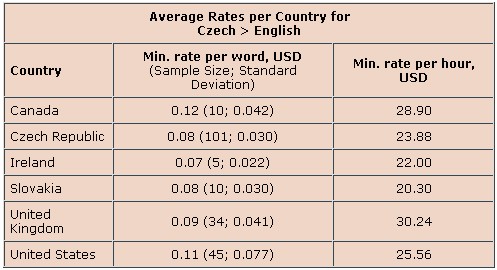
showing an average of 0.08 USD/word charged by translators living in the Czech Republic. On a local level though, I know it is very difficult to get more than 250 Kc per target page, which works out to about 0.06 USD per source word. Local companies rarely pay more than this, and often less. I’ve also applied to many tenders on ProZ and experimented with different prices, and anything over 0.06 is generally ignored. This is what Proz's statistics show for Czech to English rates:
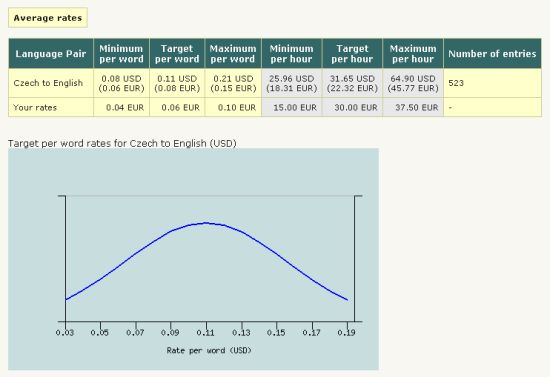 |
|

Trend in Translation Prices

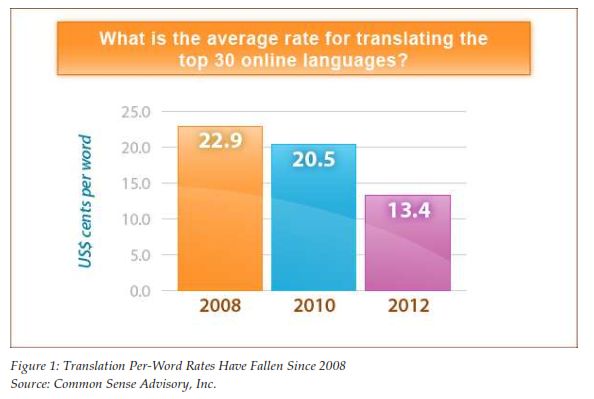
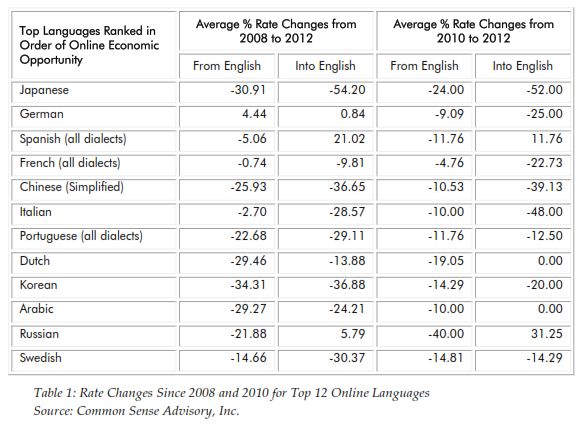
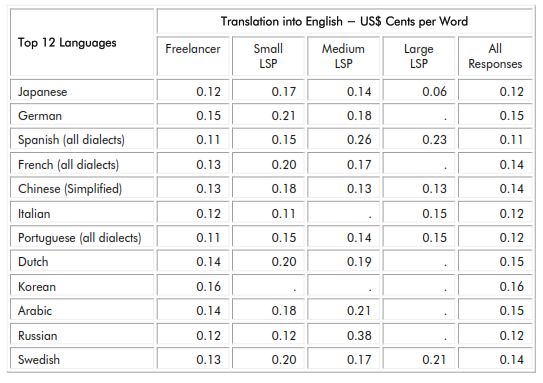
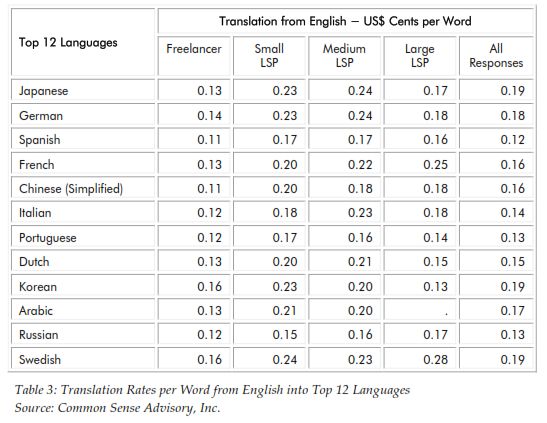

Possible Strategies When Deciding on What Translation Prices to Charge
-
pretend you are a potential customer, approach several translation companies and ask them what they would charge for a particular document. Companies will generally charge between 0.01 and 0.06 Euro/USD per word, possibly more, in addition to what the translator charges.
-
before filling out many application forms you might want to phone around to a few translation companies and ask them what rate they generally offer their translators.
-
when setting your price make a note somewhere that you can be flexible with your fee, depending on the project particulars.
-
when offering a price to a direct customer, consider what companies charge and offer something slightly less, but more than what the companies generally offer their translators.
-
 when bidding on tenders, scatter your prices and
experiment. If one customer accepts your higher offer, you are not bound to take
work from another offer where you submitted a lower price. With such
experimentation you can develop a “feel” for the market.
when bidding on tenders, scatter your prices and
experiment. If one customer accepts your higher offer, you are not bound to take
work from another offer where you submitted a lower price. With such
experimentation you can develop a “feel” for the market. -
before submitting a price on a particular project, make sure that you understand the conditions (due date etc.) and take a good look at the text. Try to translate some parts, at least in your head. If it is very difficult for you and will take you longer to translate, you should raise your price accordingly. On the other hand, rather than squeeze yourself out of the market, you may consider accepting a more competitive rate and use the opportunity to practice and research the field. Over time you will be able to translate faster, and during which you could have built up useful translation memory and glossary terms. At least this way you will secure for yourself a steadier supply of work, you could eventually be considered an expert and start raising your prices.
-
if the deadline is short for the volume and you will have to work hard and long hours to meet the schedule, you should generally charge more. But keep in mind that you are also earning more by translating the higher volume over a shorter period of time, and your competition might be willing to accept their standard rate. Again, it is good to be vague with your pricing. You can try a higher price, but if you need the work, you can mention words like “flexible” and “I would like to charge”.
-
if you are receiving repeat and regular work from a satisfied customer, you might consider asking them for a price increase. But always be polite, as an offended customer is easily a lost customer, and winning customers in the first place can be a lengthy and time-consuming process.
-
if you are getting more work than you can handle and from different sources, this is the perfect time to increase your translation fee to new customers. To convince potential new customers of your high quality services, beef up your CV and website with testimonies from your existing customers, and translation samples from your more difficult projects.
Follow-up: What to Do After Submitting Your Translation Price, Rate or Fee
If it is an important or large project, it is good to send your offer from at least two sources/email addresses, to make sure your potential translation customer receives your application (because of spam filters etc). If you do not hear back from them you can write in a few days to further express your interest. But keep in mind that such large and potentially lucrative projects can receive applications from many translators, and that the project managers could be swamped trying to process them all. But by expressing your keen interest you are revealing your enthusiasm, which is important, as well as your potential to decrease your price, if that is an issue.
Once your potential client expresses interest in your application they will often ask you to jump through some hoops, such as to provide a free translation sample, references or other tedious and non-paying work. If you have not done so already now is a good time to check out the company’s payment reputation. If the company has a good reputation. If the company has a good reputation it is quite possible it could lead to lots of future work, in which case it is worthwhile to do the necessary prep work. But make sure to do it properly, because any shortcomings could cast a poor impression. If you did not fill in their application form correctly, or you left mistakes in your translation sample, they will think you will be lenient and that there could be many problems if they did decide to send you some work. For this you might like to read up on our translation project bidding suggestions [..
 To make yourself look better in the eyes of enquiring
customers, you might also consider obtaining certification from one or more
sources. Get tested and prove your abilities. If you provided good quality to
other customers in the past, try to get a reference from them. If you
accomplished some difficult translations and you are not dishonouring a
non-disclosure agreement, consider posting to your online profile some samples
of your previous work. You are not only competing in price, so make sure you
look good to your potential client.
To make yourself look better in the eyes of enquiring
customers, you might also consider obtaining certification from one or more
sources. Get tested and prove your abilities. If you provided good quality to
other customers in the past, try to get a reference from them. If you
accomplished some difficult translations and you are not dishonouring a
non-disclosure agreement, consider posting to your online profile some samples
of your previous work. You are not only competing in price, so make sure you
look good to your potential client.
It’s a competitive industry, but there’s also a lot of work
to be had, since the industry generally grows by 20% each year (relating to a
globalizing world and increased trade between countries). There are also many
benefits of working in the comfort of your home. Therefore, think sharp and good
luck!

|
If you have any suggestions or comments we’d love to hear back from you! [Jul 3, 2016] Wow what a through explanation, I was waiting for this article as I was very much confused about my translation rates to be asked from a client. Thanks you cleared much. I am an Indian Translator and got an offer from an Indian English writer to translate his best selling book into Hindi. Gave my rates though, what you think would be the rate for English to Hindi translation of a 225 page book? According to the above database query, 94 translators had submitted their rates for English to Hindi, the average working out to 0.061/w. But for a book I would usually offer a discount, and depends on how difficult the translation is and the deadline. If you have more time for the translation, you can take on other work and use the big project as a filler, in which case you can offer more of a discount. Always turns out a bit of a dance and play with the customer when trying to set a final price. Make sure you get paid in installments as you make partial deliveries, unless you completely trust the customer. |
KENAX Translation Services - Quality service at a competitive price | Contact
The previous text for this page (the updated version is above)
This could be a difficult subject for a translation agency
to post, as the translator will always want to receive the most for their hard work, and
the translation agency always pay the least, so that it could win the most tenders.
Basically it is a bidding war. Any agency, or even individual translator, can post their
service on the internet, where files and even payments can be effortlessly transferred as
if the end client and translator were located in the same city. In fact, we have mediated
work where both the translator and the customer were located near to each other, without
even knowing, while on the other side of the world from us. |
|
Historically, there are several types of bidding processes. The bidding
may be open, so that everyone knows what the highest bid is. The bidding may start at some
basement price. Other times the bidding is closed, meaning the bidders have to guess, in
which case they might end up paying substantially more than the second highest bidder.
For translations, the matter is made further complicated because the bidding is not on the
same product, meaning that the quality and speed offered by the individual translators
often differs.
|
Sometimes a customer may require only an informative
translation, not requiring great quality, nor even a translation by a native speaker.
Hence the bidding "war" includes non-native speakers in lower cost countries. |
The way we like to work is to charge a low flat rate on top of whatever
the translator charges. With our global system of
translation services and our project managers located on different time zones, we have
managed to reduce our overhead to enable us to charge this low surcharge on top of
whatever the translator charges. This enables us to win more tenders, whereby we might end
up using the same translator as any other agency, increase our volume, in turn reducing
our markup further, to win more tenders and increase our volume further.
So no matter how much the translator charges or the customer agrees to pay, our markup
will always remain the same (although we may charge more for first time customers to cover
the risk of non-payment).
It may seem unethical for us to disclose what the other translators are
charging, as such opening up the table to a bidding war so to speak, but enough of our
translators have asked for this information in the past, which is why we have decided to
make this information public (shown below).
Keep in mind that these prices are a general guideline of the average charged by quality
translators and do not necessarily represent some ceiling for us or what we hope to pay.
Sometimes we get very large projects which need to be accomplished in very short periods,
and for which we often resort to much more expensive translators, just to get the job done
on time. In these cases we would add up the total charge for the entire project, divide it
by the number of words translated to calculate a per word price what it cost us, perhaps
offer some discount to the customer because of the overall size of the project, and then
round the figure to some nice sounding price, issuing an invoice to the customer based on
that.
Most of our customers trust us and accept our strategy, and most of the time our estimate
at the beginning of a project is very accurate. Other times the customer may demand a
concrete price in writing, in which case we would be forced to guess on the higher end, to
protect ourselves against the unforeseeable. This is just the usual issues of running any
business.
For each project we always ask the translator what they
would like to charge, and move forward from there. Perhaps a lot needs to be done over a
holiday, or the subject matter is very technical. We never force our translator to agree
on a permanently defined price and they are always entitled to change their price at any
moment. Based on a preliminary response from our translators, we can then issue a price
estimate to the customer, and if we win the tender based on that, then we can proceed from
there. |
|
Other times the translator can be busy with other work, charge something
more because of the headache of having to go into overtime, and we might accept the higher
price because the situation demands it and the customer's budget can afford it.
Or other times the translator may have developed a good name for themselves, with steady
clients sending them subject matters they are comfortable with. Such a translator is in an
excellent position, and can afford to charge a higher price to new clients. Heck, such a
translator can even begin to farm out projects to other quality translators, control their
work, charge their own markup rate, increase their volume, and eventually begin to operate
like an agency. This is the wonderful power afforded by the internet. I myself translated
for 8 years and during which time I slowly migrated to operating only an agency. In fact,
I still translate from time to time, although I much more enjoy project management and
company development.
My suggestion is to always seek new customers when you do not have paying
work. If you want to develop an agency while most of your earnings comes from your own
translation work, you can work on that on your own free time. When looking for new
customers, you can spend your time approaching a list of translation agencies like ours (or for a small fee have us do this
for you), or filling in their translator application forms, or provide them with free translation
samples. All this takes an investment of time. In the beginning you might offer a more
attractive rate just to secure yourself with enough work, but over time, as you build up a
reputation for yourself and steady clients with a steady stream of work, you can start to
charge more to new clients, or approach your existing customers and ask if they might
offer you more, considering how reliable you have been for them all these years.
You might consider a premium rate for express work or on translations which need to be
accomplished over the weekend or holidays. You may devise different rates for different
subjects or volumes. Everything is possible, and every business does this. Just think
about the airline industry, which charges premium rates for the business class who need a
flight on short notice, while offering much cheaper rates for tickets bought well in
advance, or even lower rates for student or standby tickets. Which are tickets sold only
when some seats remain available and just before takeoff. In economics and business
language this is called price discrimination, which in some ways can be considered illegal
or unethical, but practiced nevertheless. For this purpose very complicated software
programs have been developed for the airline industry, estimating which seasons will be
busier, and formulating a complex price grid, all designed to maximize profits for the
airline company by charging different prices to different people.
So you can certainly try your own price discrimination, although I do not think there is
any software developed like this for the translation industry. You might approach a few
translation agencies (by pretending you are a potential customer) and see what they charge
for your language combination and expertise, in turn charging them an appropriate price.
|
When charging a direct customer as opposed to a translation agency, you might try charging something in between what an agency charges and what you would normally charge an agency. If you establish a good name with direct clients, there is no reason why you couldn't charge as much or more than the agency if you are really good or are knowledged in a special area, which your customer needs. When submitting your price to a new client, you can also be vague and try something on the higher end. You can say "Some of my existing customers pay me", or "If possible", and include "price negotiable", for example. You obviously want as much as possible, but you do not want to scare away your new potential client either, so if you are quoting high, do not make it seem like your price is firm and set in stone - unless of course you are so well established you do not need to look for other customers. In such a case you are ideally established, and you might consider screening your own translators and quality control their work, so that you can offer a higher capacity. |
Prices often vary among language combinations precisely because of the
costs of living in those countries.
Typically, translations in Scandinavian languages will cost a lot more than, for example,
Hindu or Russian translations. This has nothing to do with the quality of the respective
translators but everything to do with the costs of living of the countries where these
languages are mostly spoken. Of course, it may happen that a Swedish translator has
decided to move to Beijing China, has chosen to charge three times the local Beijing rate
for his translations from German and English into Swedish, is quite well off at those
rates considering the cost of living in China, while offering a rate which is less than
half what the average Swedish translator is forced to charge because they live in
Stockholm. So such a China based Swedish translator can benefit from lots of work and live
quite well. This again is the strength (or for some, the annoyance) that the internet
offers, but such is the fact of life in this increasingly global marketplace.
This is why you should consider the prices we have posted below as a very rough guideline. They are based on the prices of quality translators we have found. This is not to say that we have not found less expensive translators, like the quality Swedish translator living in China, but we have chosen not to post these "extremes" but rather just the average. There are also many translators who charge more than this, but at the below prices we have not found it difficult to find quality translators.
Possible Guideline to Help You Set your Prices
After a debate on ProZ, I modified the below data and aspire to achieve some "wiki consensus".
I will break up the prices according to the following. For those who are only just considering to start a career in translations, an average seasoned translator can translate between 2500 and 5000 words a day.
1) Your Local Rates
Ask your local translation agencies what they offer.
2) According to Projects I have Managed in the Past (table above)
These generally reflect the lowest price levels offered by my quality native translators. It should also reflect the local prices for those countries, quite possibly on the higher end. It could be a good price suggestion for someone who would like to work on the global web translation market.
3) ProZ's and Translator Café's Posted Rates
ProZ's rate data is only available for full paid members, but TC's is open to free members. Taking Czech to English translations as an example (because I have many years and active experience in this language combination), TC's rates show the following:

From my experience these definitely do not reflect local prices in the Czech Republic (TC's are significantly higher), so perhaps consider these as aspired prices. Or what would apply if you live in Western Europe. The translation market is a very competitive place so it's good to do some research and see what options are best for you. Or combine approaches and see where that leads to.
4) According to Applicants in our Database
This table is drawn from our own database of applicants, while removing the extremes (above 30 and below 1 cent a word). It is raw data only and the quality of the translators has not been verified. We get about 4 applicants a day, from all over the world.
You may add your own rate and I will continue to develop this as interest in it increases. The averages script timed out before it could make the complex calculations, so unfortunately it did not include all the language combinations (stopped at Portuguese to Turkish). I will try to resolve this later to include all the language combinations.
Other Websites to Help you Choose your Translation Rates
|
|
Important Translator or Translation Rates, Charges, Prices and Fee Links
Translation Payments Reputation - before you take on a translation project from a new client you should check out what other translators have said about their payment practices and if they are a reliable payer.
Getting Paid for Translation Work - once you have translated for them but are finding difficulties getting paid, read what a couple of international lawyers have said about extracting payment.
Translation Tips - to help you do a good job translating, which will bring you repeated translation work and increase your chances of getting paid.
Translation Resources - links to various translator resources to help you with your work.
Translation Jobs - many forums and resources to help you find translation work.
Translation Agencies - or approach the agencies directly by email without hunting down their addresses on the net.
Translator Application - come join our growing team!




